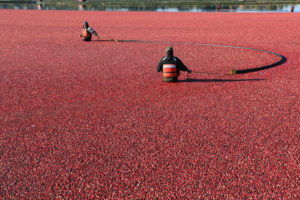This content has been archived as it may no longer be accurate or relevant.Susan Main, Speaking of Safety; 13 September 2017
In a cranberry harvest, fields are flooded with water. Lifejackets or personal floatation devices (PFDs) are essential to prevent workers from drowning.
A cranberry harvest is unique. The fields are flooded and workers knock the berries off their vines, then skim them from the water’s surface. Wearing a lifejacket or PFD reduces a worker’s risk of drowning in shallow or deep water.
Water depth varies in a cranberry field. Safety advisor TJ Garcha of AgSafe (B.C.’s safety association for farm employers and workers) says some parts could be up to 3 feet deep – or even more.
“These fields aren’t exactly like a swimming pool. They’re flat but there might be a bit of a dip here and there. Depending on a person’s height, the water could be up to chest level and that’s a lot of water. Your body slows down in water. Your reaction rate is much slower.”
When people fall face-down into water, they can drown, even if the water is only a few inches deep, TJ says.
This summary of a WorkSafeBC incident investigation, Worker died after being submerged in flooded cranberry field, describes a tragedy that happened in deeper water. While harvesting cranberries in a flooded field, a worker inadvertently walked into a 6-foot-deep ditch. His co-workers rescued him, but he died in hospital. It makes me so sad to think that this could have been prevented with a lifejacket.
What’s the difference between a lifejacket and a PFD?
Lifejackets are designed to turn unconscious people face up in the water, so they keep breathing. Personal flotation devices (PFDs) are more compact and keep people afloat but cannot turn them face up.
A PFD is sufficient if a worker is not alone and another worker can help immediately. Otherwise, a lifejacket is needed.
WorkSafeBC says a worker must wear a lifejacket “when he/she is not within eyesight or earshot of another worker who can immediately come to the first worker’s aid in the water” (page 2 of the safety bulletin Flooded cranberry fields and reservoirs may pose drowning risk).
TJ says some employers and workers don’t see the point of lifejackets during the cranberry harvest. “They say ‘I’ll be fine. How can I drown in this?’ But it’s about the potential of what could occur. It doesn’t really take much effort to put on a lifejacket, and it’s your life that’s at stake here.”
For more information, see this toolbox meeting guide about personal flotation devices and lifejackets in cranberry fields.
Click here to see the original article
Share this Post

